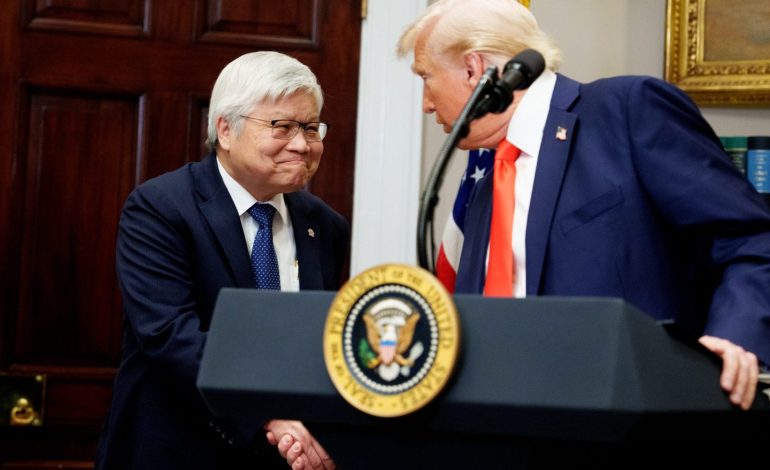Taiwan Semiconductor Manufacturing Company (TSMC) has pledged to invest $100 billion in expanding its US operations, a move celebrated by President Donald Trump as proof that his “America First” investment plan is working, Fortune reports.
However, industry experts and officials in Taiwan argue that this investment will not significantly alter the global chip supply chain, as the bulk of TSMC’s advanced semiconductor production will remain in Taiwan.
TSMC’s investment plan includes adding two advanced packaging facilities, three semiconductor foundries, and a research center to its Arizona plant, bringing its total US investment to $165 billion. President Trump credited his tariff threats on Taiwanese chips for the company’s decision, while dismissing previous US subsidies under the Biden administration as a factor. However, Taiwan’s government and TSMC executives insist that these investments are driven by customer demand rather than political pressure.
“TSMC’s global expansion is a crucial development,” said Taiwan’s Economics Minister Kuo Jyh-Huei.
He emphasized that tariffs played no role in the decision. TSMC CEO C.C. Wei echoed this sentiment, noting that the US investment was necessary to meet increasing global demand.
Despite its growing international footprint, TSMC’s most advanced semiconductor production remains in Taiwan. The company continues to manufacture 90% of its 5-nanometer chips there, and its latest 3-nanometer chips are produced exclusively on the island.
Analysts believe that Taiwan’s dominance in chipmaking will remain intact.
“Most of TSMC’s capacity is still in Taiwan,” said Hui He, research director at Omdia. “I don’t think Taiwan will be less important if U.S. capacity increases.”
The strategic importance of Taiwan’s chip industry—often referred to as its “silicon shield”—has also raised political concerns. Taiwan’s opposition party, the Kuomintang, and the Taiwan People’s Party have questioned whether TSMC’s expansion could weaken Taiwan’s technological edge. Meanwhile, Chinese officials have speculated that TSMC is becoming the “United States Semiconductor Manufacturing Company,” though they provided no evidence for this claim.
While the Arizona plant will increase TSMC’s US production, it is not expected to manufacture the cutting-edge chips currently produced in Taiwan. Instead, it will focus on slightly older technologies, porting over established processes rather than leading new developments.
Morningstar equity analyst Phelix Lee noted that the high costs of construction and manufacturing in the US make Taiwan a more attractive location for research and development.
“TSMC has previously said construction and manufacturing are both more expensive in the US, and it prefers to keep R&D and manufacturing close in Taiwan,” Lee wrote in a recent report.
David Chuang, a senior research analyst at Isaiah Research, expressed skepticism about the full realization of TSMC’s $100 billion US investment.
“The market is there, but it boils down to the value proposition. How much can TSMC charge for US manufacturing?”
TSMC’s Arizona plant is currently focused on producing a simplified version of its 4-nanometer chips, which are used in less powerful devices like smartwatches rather than high-end smartphones. As the AI boom continues to drive demand for increasingly advanced chips, experts predict that Taiwan will remain central to meeting this demand.
“The US capacity will always be lagging behind,” Chuang said.
He highlighted that the timelines for next-generation chip production are still more aligned with Taiwan than the US.









